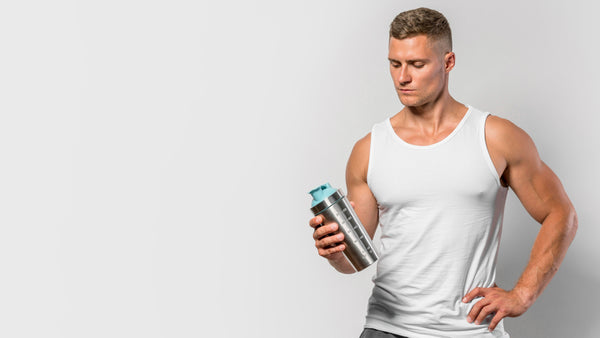Workout nutrition is like fuel for your body's engine, powering you through intense workouts and aiding in efficient recovery. Whether you're hitting the gym,or engaging in a yoga session, your pre and post-workout meals can significantly impact your performance and results. In this guide, we'll delve into the of pre and post-workout nutrition to fuel your body and optimize your fitness journey.
Pre-Workout Meal: Workout Nutrition
Before you dive into your workout, it's crucial to fuel your body with the right nutrients to maximize performance and prevent fatigue. A well-balanced pre-workout meal provides the energy and endurance needed to power through even the most challenging sweat sessions. Given in this blog are some of the best foods for workouts.
So, what to eat before a workout? Aim for a combination of complex carbohydrates and lean protein to provide sustained energy and support muscle function. Here are some pre-workout meal ideas to consider:
- Oatmeal with Greek Yogurt and Fruit: This powerhouse combo offers a blend of complex carbs from oats, protein from Greek yogurt, and natural sugars from fruits, providing a steady release of energy in your fitness workout.
- Whole Grain Toast with Peanut Butter: A very common choice of pre-workout meal. Packed with healthy fats and protein, this simple snack acts as an instant energy booster and helps keep hunger away while workout.
- Banana with Almond Butter: Bananas are rich in potassium, which aids in muscle function and hydration, while almond butter provides a dose of healthy fats and protein for sustained energy.
- Avocado Toast with Poached Eggs: Healthy fats from avocado help with sustained energy, while protein from eggs ensures sustained amino acid flow for optimal muscle function and recovery during workout
Remember to hydrate adequately before exercise with an adequate intake of water or electrolyte-rich beverages to optimize performance and prevent dehydration.
Post-Workout Meal: Recovery Food After Workout
After you've met your workout goals, it's time to refuel and repair your muscles with a nutrient-rich post-workout meal. This critical window of opportunity allows your body to replenish glycogen stores, repair muscle tissue, and kickstart the recovery process for enhanced performance and results.
Here are some post-workout meals or recovery food after exercise:
- Protein Smoothie with Fruit: Blend up a protein-packed smoothie using your favorite protein powder, fruits like berries or bananas, and a handful of leafy greens for added vitamins and minerals.
- Grilled Salmon with Sweet Potato: Salmon is an excellent source of omega-3 fatty acids and high-quality protein, while sweet potatoes provide complex carbs and essential nutrients like potassium and vitamin A.
- Quinoa Salad with Chickpeas and Veggies: Quinoa is a complete protein, making it an ideal post-workout option, while chickpeas add fiber and additional protein to support muscle repair. Load up your salad with colorful veggies for added vitamins and antioxidants.
- Brown Rice with Grilled Chicken: For those opting for a heartier meal, brown rice paired with lean protein from grilled chicken offers a perfect balance of carbs and protein to ensure optimal recovery after your workout.
Fluids are just as important a part of workout nutrition as recovery foods after exercise as an instant energy booster. In addition to healthy eating for exercise, don't forget to hydrate post-workout to replenish fluids lost through sweat and support optimal recovery.
Supplements and Superfoods: Enhancing Your Performance Naturally
While whole foods should form the foundation of your workout nutrition, certain natural supplements and superfood plant proteins can complement your diet and enhance your performance and recovery.
Instant Energy Boosters: Consider natural supplements like caffeine or green tea extract to boost energy and focus before your workout.
Weight Loss Supplements: If weight loss is your goal, supplements like green coffee bean extract or conjugated linoleic acid (CLA) are the go-to weight loss supplements to support fat loss and metabolism.
Superfood Plant Proteins: Plant-based protein powders made from sources like peas, hemp, or brown rice can provide a convenient and effective way to meet your protein needs if you follow a vegan or vegetarian diet.
Natural Supplements for Recovery: Look for natural supplements like turmeric or tart cherry juice, which have anti-inflammatory properties and can aid in muscle recovery and soreness.
However, it's essential to remember that supplements are meant to complement a healthy diet, not replace it entirely. Always consult with a healthcare professional before adding new supplements to your regimen to ensure they are safe and appropriate for your individual needs.
Conclusion
In the realm of fitness nutrition, your pre and post-workout meals are crucial for performance, recovery, and results. Healthy eating for exercise and workouts, along with adequate hydration, and incorporating supplements wisely, you can optimize your fitness journey. Keep in mind that there's no universal formula; experiment with various foods, timings, and supplements to tailor your approach to your body and goals. With a balanced nutrition strategy and dedication to your workouts, you'll be on track to realizing your fitness ambitions.
People also ask:
- How long before a workout should I eat?
Usually, people aim to eat 1 or 2 hours before exercising. This gives the body the time to digest and convert food into energy.
- Is it important to eat after a workout?
Yes, it's important to eat after a workout to replenish glycogen stores, repair muscles, and aid in recovery. Aim for a meal or snack containing both carbs and protein within 30-60 minutes post-exercise.
- Can I eat a full meal after exercising?
Yes, you can eat a full meal after exercising, especially if it's within the post-workout window, just keep a gap of 30 mins. Opt for a balanced meal containing carbs, protein, and healthy fats to support muscle repair and recovery.
- Is it okay to exercise on an empty stomach?
It's okay for some people to exercise on an empty stomach, especially for light or moderate workouts. However, for intense or long-duration exercises, it's generally better to have some fuel in your system to sustain energy levels.
- How can I prevent muscle cramps during a workout?
Stay hydrated before, during, and after workouts. Ensure you're consuming enough electrolytes, such as potassium, magnesium, and sodium, through foods or drinks. Stretch before and after exercising to prevent muscle tightness. Incorporate strength training to improve muscle endurance and reduce the risk of cramps.

























